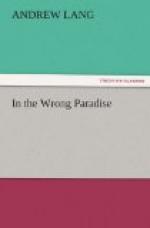“Where congregations ne’er
break up,
And sermons never end!”
And now, lo and behold, here I am in their heathenish Gehenna, where the Sabbath-day is just clean neglected; indeed, I have lost count myself, and do not know one day from the other. Oh, man, it’s just rideec’lous. A body—I mean a soul—does not know where to turn.” Here Peter, whose accent I cannot attempt to reproduce (he was a Paisley man), burst into honest tears. Though I could not but agree with Peter that his situation was “just rideec’lous,” I consoled him as well as I might, saying that a man should make the best of every position, and that “where there was life there was hope,” a sentiment of which I instantly perceived the futility in this particular instance. “Ye do not know the worst,” the Rev. Mr. McSnadden went on. “I am here to make them sport, like Samson among the Philistines. Their paradise would be no paradise to them if they had not a pale-face, as they say, to scalp and tomahawk. And I am that pale-face. Before you can say ‘scalping-knife’ these awful Apaches may be on me, taking my scalp and other leeberties with my person. It grows again, my scalp does, immediately; but that’s only that they may take it some other day.” The full horror of Mr. McSnadden’s situation now dawned upon me, but at the same time I could not but perceive that, without the presence of some pale-face to torture—Peter or another—paradise would, indeed, be no paradise to a Red Indian. In the same way Tertullian (or some other early Father) has remarked that the pleasures of the blessed will be much enhanced by what they observe of the torments of the wicked. As I was reflecting thus two wild yells burst upon my hearing. One came from a band of Apache spirits who had stolen into the Ojibbeway village; the other scream was uttered by my unfortunate friend. I confess that I fled with what speed I might, nor did I pause till the groans of the miserable Peter faded in the distance. He was, indeed, a man in the wrong paradise.




